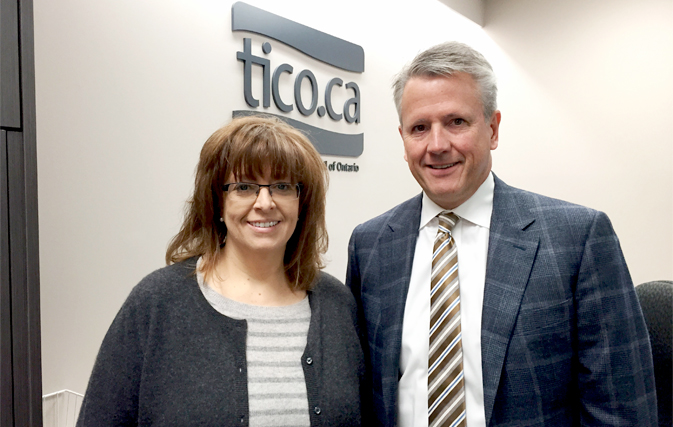TORONTO – Following the recent news of proposed amendments under the Travel Industry Act (TIA) and a possible increase of the Compensation Fund, TICO held a media briefing to discuss these latest initiatives as well as the rising trend of industry fraud.
Several proposed regulatory changes to TIA have been brought to light this week, such as all-in pricing that would include all fees, levies and other charges when advertising travel services, more flexible registration and operating requirements for not-for-profit corporations promoting tourism in Ontario, as well as the exemption from TIA requirements for businesses that exclusively offer one-day tours. It’s also been proposed to align claim filing deadlines from three months to six months. This would apply to both Standard and Trip Completion Claims.
According to Dorian Werda, Vice President, Operations of TICO, all-in pricing should help alleviate the suspicions of consumers who are often surprised by hidden fees after booking a trip. And President and CEO Richard Smart added that all these proposed changes, not just all-in pricing, have been raised time and time again by the travel industry for many years.
If passed, all-in pricing would take effect on Jan. 1, 2017, while all other proposed changes would start July 1, 2016.
As for the proposed Compensation Fund increase, which would see rates go up from $0.15 to $0.25 per thousand dollars of Ontario travel sales on July 1, Smart stresses that this jump is actually lower than what was originally approved by the Board in 2012. Back in November 2012, the Board had approved a three-pronged rate increase that would take place over several years: $0.05 to $0.15 in 2012, $0.15 to $0.25 in 2013, and an increase from $0.25-$0.30 in 2014. However, prongs two and three were never implemented since TICO was able to hold the CF Rate at the lower level due to controls over costs and lower claims experience.
“With this new rate increase, we’re really setting the rate back to what it was in 2001,” said Smart.
The effect this increase would have on registrants varies, depending on their size and complexity. For registrants with travel sales under $2 million, their current rate would jump from under $300 to approximately $500. Registrants with sales from $2-$5 million would pay anywhere from $500-$1,250, while those selling $5-$10 million would pay from $1,250-$2,500. Larger operations that sell from $10-$50 million would pay upwards to $12,500 while registrants with over $50 million in sales would see their rates increase from $7,500 to $12,500.
“Nobody likes a fee increase but the reality is the industry has evolved, the complexity of it has accelerated significantly in the past few years due to an increase in claims and fraudulent transactions,” he added.
The topic of fraud was a new component added to TICO’s Roundtable Sessions this year, which took place over several dates in March and various cities in Ontario. The term ‘fraud’ refers to fraud committed against retailers, consumers and wholesalers by travel agents, many of whom had TICO Certification, with some being prior registrants and/or supervisors/managers on record with TICO.
According to Werda, ‘rogue’ agents were known to be operating as an ‘unregistered’ travel agency, selling independently of the registered agency they were associated with and stealing customer funds. In many cases, agents would make bookings under their registrant’s agency name and provide personal or unrelated email addresses to receive e-tickets. Their crimes and tactics run the gamut and include: credit card misuse, unconfirmed itineraries sent to consumers as confirmed bookings, no booking made or one-way travel booked instead of roundtrip, working for more than one travel agency at the same time, and still accessing an agency’s GDS/Reservation system when no longer employed there.
Even more shocking is the fact that this is an upward trend. In 2014-2015, there were 16 fraud investigations and 95 charges laid with 34 convictions. From 2015-2016 (the fiscal year hasn’t yet ended), there have already been 10 closed investigations, 18 open ones, 94 charges laid, and 46 convictions. This has resulted in over $900,000 fines/restitution (none of which TICO has seen), 1,520 days of jail time and 1,825 days of probation. A number of travel retailers have also been hit financially as a result, some even having to cease operations due to the actions of one rogue travel agent.
So what can registrants due to protect themselves? For one thing, they need to remember that they’re responsible for the actions of “all travel counselors on contract who are selling or providing advice, including employees and/or contractors who are acting as outside sales representatives.” Knowing that they’re responsible for their agents’ actions will certainly prompt registrants to maintain a tight ship and exercise caution.
To do that, TICO is encouraging registrants to implement more controls to monitor travel sales and bookings by their agents/counsellors, develop best practices, read up on current guidelines on the TICO website and monitor customer complaints. It’s also a good idea to set an ‘ethical tone’ from the get go (ie. outline specific expectations in an agent’s contract), and conduct a fraud/risk assessment of their business. And with everyone on Facebook, Twitter and Instagram these days, registrants should also consider monitoring the social media accounts of their agents in case they’re misrepresenting their agency in any way.
TICO is planning to update its guidelines on tico.ca sometime in April. Check back to learn how you can protect your business from fraud.
To make a submission on TICO’s proposed Compensation Fund rate increase, forward your comments by April 15 to ticoconsultation@tico.ca.

